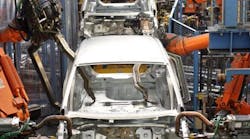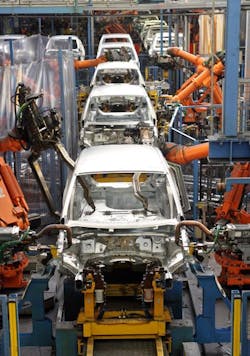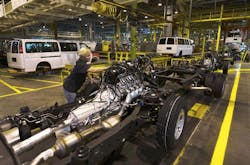Indeed, John Humphrey, senior vice president of the global automotive practice at J.D. Power, said in a statement that the November seasonally adjusted annualized rate (SAAR) for retail sales is projected to hit 13 million, up from the year-to-date level of 12.8 million.
"Consumer demand for new vehicles remains strong," Humphrey added. “The level of consumer spending in November is impressive and consistent with trends observed throughout 2013 [with] indications that total consumer spending on new vehicles this year will exceed $370 billion, the highest on record and considerably above even pre-recession levels."
As a result, J.D. Power’s partner in the light vehicle forecasting business, LMC Automotive, is holding to its projection for total light vehicle sales in 2013 to top out at 15.6 million units, with retail light-vehicle sales hitting 12.8 million units.
"Improvements in the economy and consumer confidence in 2014 will drive stable growth to 16.1 million units for total light-vehicle sales and 13.2 million units for retail light vehicles,” noted Jeff Schuster, senior vice president of forecasting at LMC Automotive, adding that as a result, year-to-date production in North America through October reached 1.6 million units, a 7% increase from October 2012.
Bill Rinna, senior manager for North American forecasts at LMC, added that the firm is maintaining its volume outlook for full year North American production to top out at 16.1 million units.
“First-quarter production in 2014 is expected to increase 4% to 4.2 million units from the same period in 2013,” he pointed out. “Overall for 2014, LMC is expecting production volume to grow 3% to 16.6 million units.”
That’s all good stuff, of course, yet light vehicle OEMs are also growing more concerned over what they view as increasingly “complex legal issues” across the world that may affect the productivity of their organizations and their bottom line.Indeed, according to the 2013 Automotive Institute Survey: Industry Challenges conducted by the global legal firm Dykema, executives at light vehicle OEMs and their suppliers are believe data privacy is becoming a bigger challenge for U.S. automotive executives when faces with doing business overseas.
With that in mind, Dykema’s survey found that only about a quarter of respondents report their companies employ in-house experts who concentrate on privacy and security changes, while the majority of them do not.
Another worry: Navigating the complicated corporate bribery laws when doing business overseas, particularly as it relates to doing business in China. While U.S. OEMs and suppliers continue to expand into China to take advantage of its growing automotive marketplace, the country’s reputation for corruption in both the private sector and government business isn’t going “unnoticed,” according to Dykema’s poll, with a wide majority of respondents chose China as posing the greatest compliance risk when doing business overseas.
“Following the financial crisis and recession, the automotive industry has taken strides over the last five years to reinvent itself,” noted Aleks Miziolek, director of Dykema’s Automotive Industry Group. “The survey shows that while this transformation has put automotive companies in a strong position to compete globally, there are several key legal and compliance challenges—by data privacy, corporate bribery and international tax laws, to name just a few—that leave them at risk of liability.”
Some other concerns Dykema unearthed via its poll include:
- Court disputes: Litigation remains a top legal concern for automotive companies with some areas of litigation seeing more activity than others. Supply chain litigation (52%), intellectual property or “IP” litigation (46%) and warranty litigation (39%) were the top three types of litigation faced by respondents’ companies over the last year.
- Counterfeit goods: Although the U.S. automotive industry witnesses an estimated $12 billion per year in trade of counterfeit automotive parts, only half of respondents have taken specific steps against counterfeiting, including customs enforcement and litigation, to protect their brand, and only a few plan to do so in the next year. While there are a number of steps a company can implement to fight against counterfeiting, this is an area of concern that is not getting needed industry attention.
- Compliance deadlines: Respondents ranked conflict minerals lowest in terms of global compliance concerns. However, automotive manufacturers are seriously addressing near-term compliance deadlines to meet the standards of the Conflict Minerals Act; a rule that requires public companies to publicly disclose whether the sourcing of conflict minerals in their products benefited armed groups responsible for human rights violations. Some 68% of respondents would consider not sourcing a supplier if it indicated products contained or likely contained conflict minerals, and 64% would consider not sourcing a supplier if it did not comply with a conflict minerals request. At the same time, the response to the survey question regarding the percentage of their Conflict Mineral Act compliant suppliers reveals many suppliers are still not compliant and/or the OEMs do not yet know whether their suppliers are compliant.
- Collaboration concerns: Although automotive collaborations often raise legal and operational questions ranging from antitrust issues to the challenges that arise when collaborating with competitors, automakers are increasingly teaming up with competitors to share costs and brainpower as fuel efficiency and environmental requirements get tougher. Specifically, 44% of OEMs and 49% of suppliers plan to enter into collaborative arrangements over the next 12 months. The desire to fund technological advancements was the top reason given for inspiring OEMs to collaborate, while the desire to expand into foreign markets was the top reason chosen by suppliers.
“Only automotive companies that are ahead of the game in addressing legal risks will truly remain competitive and prosper in the future,” stressed Dykema’s Miziolek. “Chief among these are matters regarding environmental compliance, intellectual property, corporate bribery laws, litigation, data privacy, international tax, regulatory issues and mergers and acquisitions (M&A). It’s only by understanding these realms—and developing proactive solutions to them—that automotive companies can ensure that their organizations remain at the forefront of this global industry moving forward.”
Something to keep in mind as demand for light vehicles shows now signs of slowing for now.
And may I add a "Happy Thanksgiving" to everyone out there and we'll see you next in this space in December! Enjoy your turkey-day holiday!





